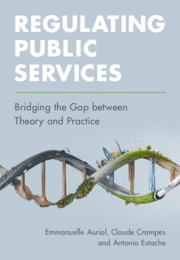Book contents
- Reviews
- Regulating Public Services
- Regulating Public Services
- Copyright page
- Contents
- Figures
- Tables
- Boxes
- Foreword
- Preface
- Acknowledgements
- Symbols
- Abbreviations
- 1 Introduction
- 2 Defining a Theoretical Normative Benchmark
- 3 Thinking Like a Monopoly about Price and Output
- 4 Regulating a Monopoly with Full Information
- 5 Regulating under Informational Constraints
- 6 Regulatory Rules to Set the Average Price
- 7 Linking Regulatory Theory to Practice through Finance
- 8 Non-Linear Pricing in Regulation
- 9 Social Concerns in Regulatory Design
- 10 Regulating Quality
- 11 On the Regulation of Investment
- 12 Regulating Multi-Product Oligopolies
- 13 Abuse of Market Power in (De)Regulated Industries
- 14 On the Relevance of Institutional Quality
- 15 Emerging Regulatory Challenges
- Bibliography
- Index
14 - On the Relevance of Institutional Quality
Published online by Cambridge University Press: 27 January 2022
- Reviews
- Regulating Public Services
- Regulating Public Services
- Copyright page
- Contents
- Figures
- Tables
- Boxes
- Foreword
- Preface
- Acknowledgements
- Symbols
- Abbreviations
- 1 Introduction
- 2 Defining a Theoretical Normative Benchmark
- 3 Thinking Like a Monopoly about Price and Output
- 4 Regulating a Monopoly with Full Information
- 5 Regulating under Informational Constraints
- 6 Regulatory Rules to Set the Average Price
- 7 Linking Regulatory Theory to Practice through Finance
- 8 Non-Linear Pricing in Regulation
- 9 Social Concerns in Regulatory Design
- 10 Regulating Quality
- 11 On the Regulation of Investment
- 12 Regulating Multi-Product Oligopolies
- 13 Abuse of Market Power in (De)Regulated Industries
- 14 On the Relevance of Institutional Quality
- 15 Emerging Regulatory Challenges
- Bibliography
- Index
Summary
Institutional weaknesses can be attributed to limited human and/or financial capacity, limited accountability, limited commitment and limited fiscal capacity. Ignoring institutional limitations increases the odds of inefficient regulation, undesirable social side effects and excessive fiscal burdens. To address some of the limitations, most countries have created specialized separate regulatory agencies (SRA). The SRA model has been less popular for water and transport regulation, which continues to be largely managed by units within ministries or agencies directly controlled by the ministries, than for telecoms and electricity. Countries with overlapping and interconnected network facilities are increasingly considering moving part of the regulatory responsibilities to supranational agencies. In contrast to the theoretical predictions, the empirical evidence on the effectiveness of SRAs in terms of efficiency, equity, financial/fiscal viability and accountability is mixed. There is no single perfect institutional solution that applies to all sectors and all countries. The existence of an agency is neither a necessary nor a sufficient condition for performance improvements of a public utility. Hybrid models that combine traditional visions with more modern approaches, which include a role for civil society and for expert panels, can be better to match the local country context.
Keywords
- Type
- Chapter
- Information
- Regulating Public ServicesBridging the Gap between Theory and Practice, pp. 335 - 361Publisher: Cambridge University PressPrint publication year: 2021

